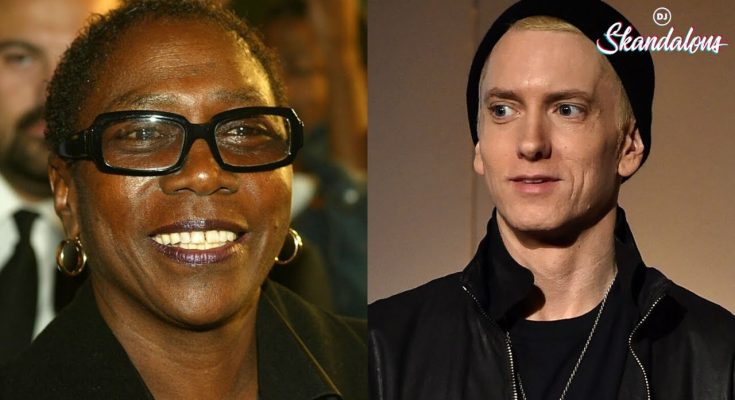During his darkest moments after quitting drugs, an old letter from Afeni Shakur helped him “get up instead of falling down.” “She told me to fight like her son did.” Eminem released the letter after nearly 20 years, shocking the world.
It had been a while since Eminem spoke publicly about his battles — not in lyrics, but as Marshall Mathers, the man behind the myth. On a gray June morning, he posted a photo of an aged envelope on Instagram. The caption was simple: “Been holding onto this almost 20 years. Time to share it.”
The letter, now yellowed with time, was written in the elegant handwriting of Afeni Shakur, activist, former Black Panther, and the mother of Tupac Shakur. The message inside was raw, personal, and to those who read it — life-altering.

Back in 2007, Eminem was fighting for his life. A near-fatal overdose in 2006 had left him broken, addicted, and unsure if he could ever climb back. He had quit pills, but sobriety wasn’t peace. It was a war with silence, anxiety, and memories he’d long buried under rhymes and Vicodin.
In an interview released alongside the letter, Eminem described that period as “the coldest, darkest time in my life. No studio, no stage, no Slim Shady. Just me and the mess I’d made.”
And then came the letter.
It arrived unexpectedly. No fanfare, no publicists. Just a single stamped envelope from Sausalito, California. Afeni had never met Eminem in person, but she had heard how deeply he revered her son. Eminem had famously written the foreword for Tupac’s 2003 poetry book The Rose That Grew from Concrete, and had even produced a posthumous Tupac album. Afeni had heard the pain in his voice, the fire in his words — and the battle he was clearly losing.
In the letter, she wrote:

“Dear Marshall, I see my son in your pain. Not just in your talent, but in the way you carry weight on your shoulders like it’s your job to carry the whole world. You don’t have to. You can rest. But don’t quit. My son didn’t. Even when they tried to silence him, he wrote louder. I hope you’ll fight like he did.”
Those lines, Eminem said, were like being “punched awake by love.”
“She wasn’t trying to save me,” he explained in the interview. “She was just reminding me who I was. Who I could be. That’s what made it real.”
He kept the letter in a shoebox, stored next to a small notebook Tupac once owned — a gift Afeni had sent along with it. For years, only his closest friends knew about it. Whenever Eminem felt the pull to fall back into the spiral — to numb out, to disappear — he would read the letter again. Not just the words, but the voice behind them.
“She was strength personified,” he said. “Tupac didn’t just get that fire from nowhere.”
Fans around the world reacted with shock and emotion as Eminem posted the full scan of the letter on social media. In the days that followed, hashtags like #LetterFromAfeni and #PacAndEm trended globally. Many shared their own recovery stories, inspired by the reminder that even legends struggle — and sometimes, they are saved by kindness in a quiet envelope.
Rihanna, who collaborated with Eminem on “Love the Way You Lie,” reposted the letter, writing: “A queen’s words can raise a king.” Kendrick Lamar tweeted, “Afeni still changing lives. Respect.”
Though Afeni passed away in 2016, her legacy continues to ripple through generations — not just through Tupac’s lyrics, but through the unseen moments like this. Eminem plans to include a spoken-word tribute based on the letter in his upcoming album, reportedly titled Shady’s Testament.
“Afeni’s words kept me alive,” Eminem said. “Not just to make music. To be a dad. To be here.”
The final lines of the letter are now tattooed on his inner forearm:
“You don’t have to carry the world. Just carry your truth.”
And in doing so, Marshall Mathers is not only standing — he’s standing for something.



